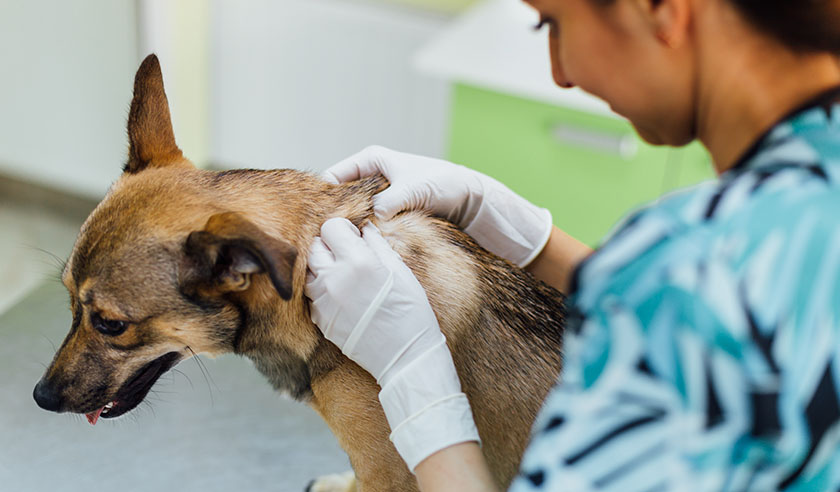There are more and more articles and ads that are about “healthy gut flora” and the microbiome in dogs. It is something that veterinarians and veterinary nutritionists are learning more and more about all the time. There are links between a healthy microbiome and a healthy dog.
What is Your Dog’s Gut Microbiome?
The microbiome is all microorganisms that can live in the intestinal tract, respiratory tract, or on the skin. It is mostly made up of bacteria but can also contain other organisms such as viruses and funguses.
Much of the discussion about the microbiome has been with the microbiome that lives within your dog’s intestinal tract. Having a wide variety of bacteria (diversity) in the gut microbiome is believed to better aid the immune cells in distinguishing between harmful or harmless bacteria and pathogens. Your dog’s microbiome can help prevent diseases by fighting off bad bacteria, enhance digestion, maintain the whole body’s immune system, keep the cells in the intestinal tract healthy, and help your dog get energy from food your dog eats. If your dog has an unhealthy microbiome, research is showing there may be links to increased risk of getting gastrointestinal diseases such as inflammatory bowel disease, obesity, and even allergies.
What Can Cause an Unhealthy Gut in Dogs?
There are a multitude of factors that can disrupt your dog’s gut microbiome leading to an unhealthy gut. Such factors include:
- Physical and psychological stress
- Medications
- Diet
- Illness or disease
- Environmental toxins
How To Keep Your Dog’s Gut Healthy
You can help keep your dog’s gut healthy by nourishing the gut microbiome, Some ways to do this include:
- Prebiotics and/or probiotics
- Certain types of fiber
- Omega-3 fatty acids
- Proper diet
- Exercise
- Maintaining a healthy weight
- Rest
- Stress management
More research is needed to fully understand the impact that gut health has on your dog’s overall health and well-being. But it certainly plays an important role and should be considered part of their overall wellness plan. Talk to your veterinarian if you have questions about your dog’s microbiome.
Prebiotics and Probiotics
Probiotics are important tools in the pursuit of a healthy dog gut. These friendly bacteria feed the microbiome, improve immune support, ease food digestion, and more. An example with people would be eating yogurt that has healthy bacteria in it.
Prebiotics are fuel for healthy bacteria and these nutrients are found in your dog’s food. Talk with your veterinarian to ensure your dog’s diet includes enough prebiotics and probiotics or whether you should supplement for added benefits.
You can get probiotics in many forms, such as powders that can be mixed into your dog’s food or pills that can be popped into their mouth or hidden in a tasty treat. Not all probiotics are created equal, so ask your veterinarian about which one is best for your pet. Be sure to read the label for whatever form you and your veterinarian choose. Some forms of probiotics require special storage because they can be sensitive to moisture, temperature, and air, even if they’re an ingredient in food or treats. It’s also important to be aware of the probiotics expiration date before feeding them to your dog.
Fiber and Your Dog’s Gut Health
It’s believed that fiber also plays a big role in a healthy gut with lots of bacteria diversity. Healthy gut bacteria gets food from many types of soluble fiber and undesirable gut bacteria is inhibited by the healthy intestinal PH that fiber helps to produce. Your veterinarian may recommend adding more fiber to your dog’s diet through a high-fiber dry or wet food or adding other foods such as pumpkin. Do not add fiber to your dog’s diet without first consulting your veterinarian since it can alter the absorption of nutrients and make sure they’re drinking plenty of water when adding a fiber supplement into your dog’s diet.
ZPC-02562
- Rodrigues Hoffmann A, Patterson AP, Diesel A, Lawhon SD, Ly HJ, Elkins Stephenson C, Mansell J, Steiner JM, Dowd SE, Olivry T, Suchodolski JS. The skin microbiome in healthy and allergic dogs. PLoS One. 2014 Jan 8;9(1):e83197. doi: 10.1371/journal.pone.0083197.





